 POISON IVY was a movie, then a franchise, and a genre, and an American institution. I don’t know if it was the first erotic thriller that could be described as “teenage FATAL ATTRACTION,” but I do think it kicked off many more of them, likely influencing movies like THE CRUSH, THE BABYSITTER, DEVIL IN THE FLESH and SWIMFAN, and evolving into WILD THINGS and CRUEL INTENTIONS and their DTV sequels. POISON IVY mostly spread its metaphorical itchy rash of underage femme fatalery by growing in clusters on late night cable and in the suspense/thriller section of video stores, but before that it had a very limited theatrical release on May 8, 1992.
POISON IVY was a movie, then a franchise, and a genre, and an American institution. I don’t know if it was the first erotic thriller that could be described as “teenage FATAL ATTRACTION,” but I do think it kicked off many more of them, likely influencing movies like THE CRUSH, THE BABYSITTER, DEVIL IN THE FLESH and SWIMFAN, and evolving into WILD THINGS and CRUEL INTENTIONS and their DTV sequels. POISON IVY mostly spread its metaphorical itchy rash of underage femme fatalery by growing in clusters on late night cable and in the suspense/thriller section of video stores, but before that it had a very limited theatrical release on May 8, 1992.
 Sara Gilbert (four seasons into Roseanne) made her movie debut starring as Sylvie “Coop” Cooper, protagonist and narrator-via-journal-entries. She’s a private school kid who sees herself as an outcast whose very rich parents don’t understand her. She wears Doc Martens, a tie-dyed yin yang shirt, and has an Egyptian eye design shaved discreetly under her hair. She smokes cigarillos, including in bed. She claims to have no friends*. She tells needless lies, like that she’s adopted, and that she’s half Black, and that she tried to commit suicide. Also she plays piano, loves her dog Fred (who she says doesn’t like any other humans), and teaches reading to inner city kids two days a week. A messed up kid but a good kid.
Sara Gilbert (four seasons into Roseanne) made her movie debut starring as Sylvie “Coop” Cooper, protagonist and narrator-via-journal-entries. She’s a private school kid who sees herself as an outcast whose very rich parents don’t understand her. She wears Doc Martens, a tie-dyed yin yang shirt, and has an Egyptian eye design shaved discreetly under her hair. She smokes cigarillos, including in bed. She claims to have no friends*. She tells needless lies, like that she’s adopted, and that she’s half Black, and that she tried to commit suicide. Also she plays piano, loves her dog Fred (who she says doesn’t like any other humans), and teaches reading to inner city kids two days a week. A messed up kid but a good kid.
In the opening she watches a new girl (Drew Barrymore, FIRESTARTER) swinging on a rope in slow motion at the water hole where the teens hang out, wearing a skirt, cowboy boots and a jacket adorned with a garish fantasy painting of a naked redhead astride a saber-toothed beast**. As is the Gen-X way, Coop is reflexively cynical about her, dismissing her as “scangie” despite transparently being in awe of her. In her journal she references Supergirl (“Not that I read comics. I’m more the politically, environmentally correct, feminist, poetry-reading type. You know, boring”) and jumps from the subject of the girl’s lips to vaginas, “not that I’m a lesbian. Well, maybe I am. No, definitely not.” So, though never addressed directly, this is pretty clearly a story about Coop coming to accept her attraction to women. And possibly comic books.
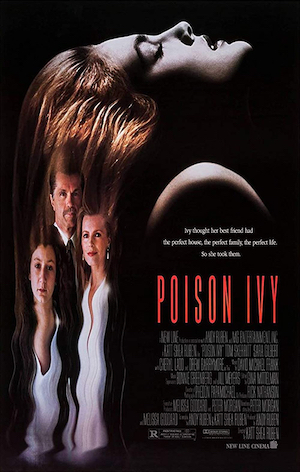 The two girls actually meet and have a conversation about hair dos and nose rings while waiting in the principal’s office. The new girl is just there about grades and a scholarship (setting up low grade class tension that will simmer throughout the movie); Coop for calling in a bomb threat to her dad’s work. This is kinda like THE USUAL SUSPECTS meeting in a police lineup. But the friendship/trouble really begins when Coop convinces her dad, Darryl (Tom Skerritt, who also started Picket Fences and appeared in KNIGHT MOVES, WILD ORCHID 2, A RIVER RUNS THROUGH IT and SINGLES that year) to give the new girl a ride home by saying she’s her best friend. She doesn’t actually know her name so she calls her Ivy, after a temporary tattoo on her thigh. We never learn her real name or see where she lives, because after initial skepticism she ingratiates herself with the family so much they let her move in.
The two girls actually meet and have a conversation about hair dos and nose rings while waiting in the principal’s office. The new girl is just there about grades and a scholarship (setting up low grade class tension that will simmer throughout the movie); Coop for calling in a bomb threat to her dad’s work. This is kinda like THE USUAL SUSPECTS meeting in a police lineup. But the friendship/trouble really begins when Coop convinces her dad, Darryl (Tom Skerritt, who also started Picket Fences and appeared in KNIGHT MOVES, WILD ORCHID 2, A RIVER RUNS THROUGH IT and SINGLES that year) to give the new girl a ride home by saying she’s her best friend. She doesn’t actually know her name so she calls her Ivy, after a temporary tattoo on her thigh. We never learn her real name or see where she lives, because after initial skepticism she ingratiates herself with the family so much they let her move in.
Coop calls her parents by their first names. Darryl is locally semi-famous for doing uptight editorials on the news, though his job is currently in question. He’s a recovering alcoholic, or as Coop explains it, “My dad— glug glug glug.” Her mom, Georgie (Cheryl Ladd, maybe the first Charlie’s Angel in Barrymore’s life) is terminally ill with emphysema, is depressed and spends most of her time in bed. Her hobbies include overmedicating and standing on the balcony thinking about jumping.
Georgie likes Ivy; she reminds her of herself when she was young, and loans her her clothes. Coop likes finally having a friend to hang out with, even if that mostly means shopping sprees and tattoos she has to pay for. For Ivy it’s all about gaining the family she never experienced, which starts to be a bit much for Coop. Weirdly the breaking point is jealousy over her dog seeming to like Ivy as much as her. Despite how she defines herself, Coop isn’t that much more enlightened than her parents – for example, she doesn’t seem to have any sort of relationship with or acknowledgment of their put-upon maid Isabelle (Jeanne Sakata, xXx: STATE OF THE UNION). And all the feminist poetry in the world can’t stop her from snapping and calling Ivy a low class slut.
That’s just based on the way she dresses. Coop has no idea that Ivy is manipulating events to be alone with Darryl, putting on Georgie’s hottest dress, getting him to drink and flirting with him. An aspect of the ‘80s and ‘90s sex thrillers that would bother more people today is that viewers were lured in by the promise of titillation and it was never gonna be just people having fun and harmless sex, it was gonna be in the context of something fucked up happening. In this case it’s not that somebody’s gonna get killed (yet), it’s that this 16 year old is messed up enough to want to be with Darryl, and he’s shitty enough to go along with it. And then it gets worse. When Georgie walks in on them looking intimate, Ivy convinces her it was innocent… then she drugs Georgie, and it’s implied that Darryl goes down on her on the bed next to his passed out wife. Which I’m against.
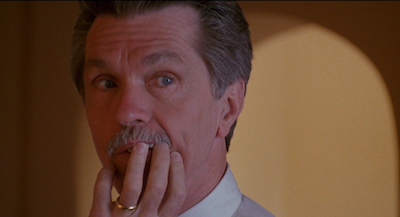 Many movies of this type have a wide selection of sleazy and/or rapey males – this one is unusual in that Darryl is the only male character who has more than a couple lines. The other sleazes I can remember off hand are a tattoo artist who’s grossness is just played as a joke and a party guest who makes a suggestive comment to Ivy while she’s serving champagne. Darryl is inescapably a sleaze via his activity with a minor and betrayal of his wife, but Skerritt doesn’t play him like a villain. At first he just seems like kind of a clueless dad unaware of what’s going on, except he keeps prominently displaying his wedding ring to ward off inappropriate sexual tension like a crucifix to a vampire. After he does the deed it doesn’t have that normal thriller turn where he lies to save his ass and pin it on her or he’s gonna kill somebody to cover up his actions or something like that. It’s more a pathetic portrait of human weakness.
Many movies of this type have a wide selection of sleazy and/or rapey males – this one is unusual in that Darryl is the only male character who has more than a couple lines. The other sleazes I can remember off hand are a tattoo artist who’s grossness is just played as a joke and a party guest who makes a suggestive comment to Ivy while she’s serving champagne. Darryl is inescapably a sleaze via his activity with a minor and betrayal of his wife, but Skerritt doesn’t play him like a villain. At first he just seems like kind of a clueless dad unaware of what’s going on, except he keeps prominently displaying his wedding ring to ward off inappropriate sexual tension like a crucifix to a vampire. After he does the deed it doesn’t have that normal thriller turn where he lies to save his ass and pin it on her or he’s gonna kill somebody to cover up his actions or something like that. It’s more a pathetic portrait of human weakness.
Darryl is in a bad place because his wife isn’t herself anymore, he misses her and is lonely, and Ivy reminds him of how she used to be (by design). And his judgment is impaired because he starts drinking again. He has his Absolut vodka in the morning and tells himself, “I can stop.” But he comes like a chump, not like Ivy’s victim. He doesn’t have the audacity to claim to have been wronged like a Michael Douglas character would.
I think politically correct Coop would find POISON IVY to be problematic. She might give it credit for being a movie written and directed by a woman (Katt Shea) in a time when there were even fewer of those than there are now, and she might agree it’s not as misogynistic as many of the predatory-female thrillers of the era. But does it subvert the genre? I don’t think so. What it does do that I think makes it stand out is execute the genre effectively while showing more empathy for the characters – especially Ivy – than is required.
There are conversations about Ivy’s relationship with her father that point to an armchair psychiatrist reading of why she would do this – that’s standard. The difference is that there’s no “Now you’ve gone too far, you crazy bitch!” moment where the audience is supposed to applaud Coop tossing her out a window or appearing out of nowhere with a hand gun or backing her over with a truck or something. New Line Cinema apparently demanded that Ivy be “punished” by dying, against Shea’s wishes – she wanted her to hitchhike away to start over with a new family, like THE STEPFATHER. But I think the choice that kind of elevates the whole movie is that Coop looks back on the events still caring about Ivy.
“I still think about her,” she says in the final narration. “I guess… I still love her. She might’ve been even more alone than I was. I miss her.”
That might be in part because the movie was inspired by a real teenage homewrecker who didn’t kill anybody. On her director commentary track, Shea explains that producer Melissa Goddard has a “story by” credit because she told Shea and co-writer Andy Ruben the story as something that really happened to her, her stepdad and her cancer-stricken mom. Shea says on her commentary track that “all this is completely true except of course the ending is slightly different.” In an interview with Yahoo, she says that an earlier version involved the movie industry, since Goddard’s stepfather was also a producer, “but we wanted to take it out of that realm because it made it kind of cheesy. Like Barbra Streisand was coming over to her house and stuff.” (I mention this only because if they kept that it could’ve been part of the LICORICE PIZZA Cinematic Universe.)
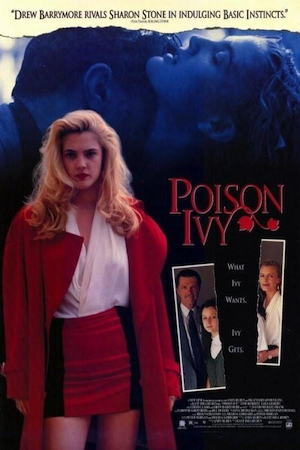 POISON IVY was only released on 20 screens, and got mostly poor reviews. It caught on, of course, because of video rentals and pay cable. It received three DTV sequels (POISON IVY II: LILY [1996], POISON IVY: THE NEW SEDUCTION [1997] and POISON IVY: THE SECRET SOCIETY [2008]). It’s easy to lump it in with those sequels, all the more explicit imitators played on late night Cinemax, and the less explicit ones on the Lifetime network, so you may be surprised to know that it premiered at the Sundance Film Festival, and that Gilbert was nominated for Best Supporting Female at the Independent Spirit Awards. She lost to Alfre Woodard in PASSION FISH.
POISON IVY was only released on 20 screens, and got mostly poor reviews. It caught on, of course, because of video rentals and pay cable. It received three DTV sequels (POISON IVY II: LILY [1996], POISON IVY: THE NEW SEDUCTION [1997] and POISON IVY: THE SECRET SOCIETY [2008]). It’s easy to lump it in with those sequels, all the more explicit imitators played on late night Cinemax, and the less explicit ones on the Lifetime network, so you may be surprised to know that it premiered at the Sundance Film Festival, and that Gilbert was nominated for Best Supporting Female at the Independent Spirit Awards. She lost to Alfre Woodard in PASSION FISH.
Shea has said that she wrote the script with Gilbert in mind, knowing she could handle it because she was such a scene-stealer on Roseanne. Gilbert wouldn’t be publicly out as a lesbian for many years, and wasn’t portrayed as one on the show, but the two characters share the quality of being cynical misfit artist types.
A week and a half after the release of POISON IVY, a Long Island teenager named Amy Fisher shot a woman in the face. Fisher had been in a sexual relationship with the woman’s 35 year old husband Joey Buttafuoco and become jealous of her. The husband served a small amount of time for statutory rape, but he was later able to cash in on his infamy by doing celebrity boxing matches and shit. Fisher was dubbed “The Long Island Lolita” by tabloids and portrayed less as a teenage victim than a predatory female like Ivy and so many characters in this type of thriller.
The sordid tale captured the imagination of the media so much that all three major American TV networks made a movie-of-the-week about it. The NBC version, AMY FISHER: MY STORY, directed by Bradford May (DARKMAN II and III) and starring Noelle Parker, hit on December 28th, and the other two both aired January 3rd. CBS had CASUALTIES OF LOVE: THE ‘LONG ISLAND LOLITA’ STORY directed by John Herzfeld (ESCAPE PLAN: THE EXTRACTORS) and starring Alyssa Milano (COMMANDO). ABC’s version was directed by Andy Tennant (EVER AFTER: A CINDERELLA STORY) and starred – you guessed it – Drew Barrymore.
Barrymore was 16 when she was cast in POISON IVY. She had not been in a movie since 1989’s FAR FROM HOME (not including a cameo in MOTORAMA) and was going through the wringer in tabloids due to a stint in rehab and a suicide attempt. She had already been legally emancipated and had published a memoir about her struggles with addiction, but Shea says that no one had seen her for a while and people didn’t recognize her while they were filming. This “I’m a grown up teen now” role began a period of cashing in on her bad girl image, which is weird to even think about now that she’s spent so many years as America’s goofy, innocent sweetheart, who has a day time talk show, a production company called “Flower Films” and a line of cookware called “Beautiful.” I’m glad she was able to survive such a harsh childhood, and I wish more troubled kids could have that same experience.
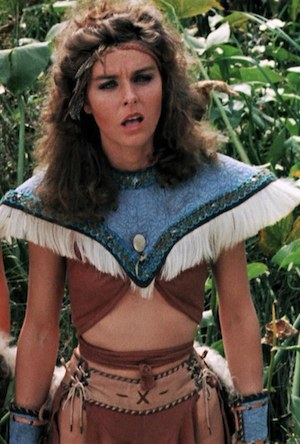
Shea started as an actress (SCARFACE, BARBARIAN QUEEN, PSYCHO III) before (with then partner Ruben) writing scripts (THE PATRIOT) and then directing movies (STRIPPED TO KILL I and II, DANCE OF THE DAMNED, STREETS) for Roger Corman. Maybe her most mainstream release after this was THE RAGE: CARRIE 2 (1999), which her IMDb bio calls “regrettably lackluster,” but I’ve always thought it was surprisingly good for what it is (an unwanted post-SCREAM sequel to an untouchable masterpiece). She took over for original director Robert Mandel (F/X, THE SUBSTITUTE) a few weeks into production, but somehow it has an odd thing in common with POISON IVY: an important character-establishing scene about a dog getting hit by a car. In POISON IVY, Coop runs to the suffering-but-still-alive animal and gets his blood splattered on her face when Ivy suddenly smashes him with a stick to put him out of his misery. In THE RAGE, outcast Rachel (Emily Bergl) is covered in the blood of her own dog and carrying him away from the scene of the accident when popular football player Jesse (Jason London) stops to help her, beginning a Carrie-Tommy type relationship.
I think both THE RAGE and POISON IVY are easy for people to look down on, but put more care into their characters than they’re generally given credit for. I do think their reputations have improved over the years, though, for that very reason.
In 2017 Shea published the novel Batshit Black: A Story of Redemption, about a rich high school kid who “recruits Jules, a seductive girl from the wrong side of the tracks, to emotionally destroy his most hated enemy.” In the aforementioned interview with Yahoo she compared it to POISON IVY saying “That story could [still] get made because it’s not about an older man – it’s really about those two girls.”
Speaking of her exploitation past with Yahoo she said, “I don’t make these kinds of movies anymore, because I kind of outgrew it. I just want to make stories that help people or inspire people and that sort of thing.” (That would include 2019’s NANCY DREW AND THE HIDDEN STAIRCASE.) “But those stories still deserve to be told, and they really hit a nerve with people. People still come up to me and go, ‘You made POISON IVY!’… I feel kind of bad about it. Young girls are saying this to me, and they revere Ivy. I’m like: ‘It wasn’t supposed to go that way!’”
But it probly wasn’t supposed to be remembered as much as at is 30 years later either, so good job on that.
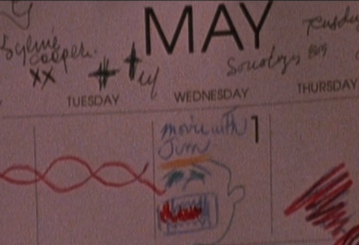 *Oh yeah? Then how come on your calendar it says “Movie with Jim” on Wednesday May 1st? Is this Jim fella gonna be offended when he finds out he doesn’t count as a friend?
*Oh yeah? Then how come on your calendar it says “Movie with Jim” on Wednesday May 1st? Is this Jim fella gonna be offended when he finds out he doesn’t count as a friend?
Of course you know me, I had to try to figure out what movie Coop and Jim might’ve gone to see on Wednesday, May 1st, 1991. The new movies released the previous Friday were OSCAR, A KISS BEFORE DYING and TOY SOLDIERS. OUT FOR JUSTICE came out the week before that, so I’m gonna assume that’s what they saw. Other movies playing at the time include THE SILENCE OF THE LAMBS, TEENAGE MUTANT NINJA TURTLES II: THE SECRET OF THE OOZE and NEW JACK CITY.
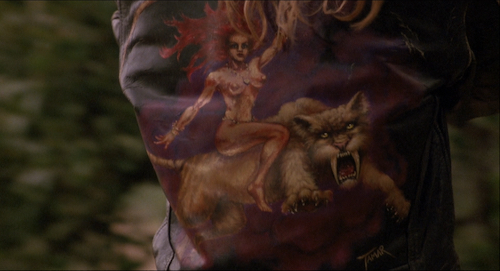 **Thanks to the “Tamar” signature on the jacket I figured out the painting is by Tamar Dick, an artist who worked as a set painter on many movies and TV shows, apparently designed something for Michael & Janet Jackson’s “Scream” video, and puppeteered marionettes for THE HOWLING VI: THE FREAKS.
**Thanks to the “Tamar” signature on the jacket I figured out the painting is by Tamar Dick, an artist who worked as a set painter on many movies and TV shows, apparently designed something for Michael & Janet Jackson’s “Scream” video, and puppeteered marionettes for THE HOWLING VI: THE FREAKS.
RANDOM NOTES:
Leonardo DiCaprio is credited as being in the movie as “Guy,” his second movie ever, following CRITTERS 3. Shea says she was “forced to cut him out” but “sneakily made sure he was still in the credits so that he would get paid, he would get residuals.” A clip on Youtube has been purported to show him as one of a few kids running out of the school, but having checked the scene on blu-ray I really don’t think it looks like him or the hair he had at the time.
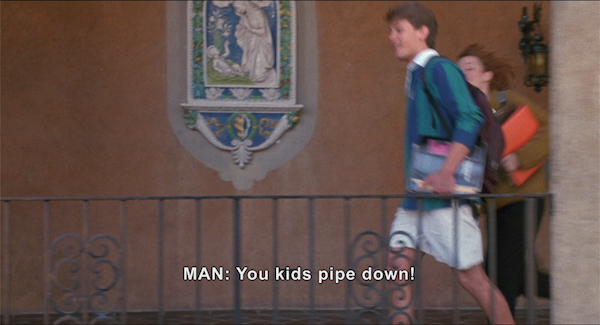
Outside of a few signifiers for Coop being “alternative” there aren’t as many era-specific references as there could be. I don’t remember seeing a bedroom full of cheesy band posters or anything, and I guess this is a little before every movie like this had a mix tape soundtrack with a bunch of bands signed to a record label affiliated with the studio. The score by David Michael Frank (OUT FOR JUSTICE, BEST OF THE BEST 2) is actually very classy and timeless. The one scene that gives me the dated cheesiness I desire is when Coop escapes from a hospital and hitchhikes with some goth type dude, credited as “Deathrocker” (Angel Broadhurst, one episode of Married… with Children). He’s listening to a song by the band Ugly Kid Joe, who I will not judge except to say at the time I thought they sucked. Weirdly during the ride she changes into clothes he gives her (“Enjoy the duds. I stole them myself”) even though she puts a coat over them in the next scene. I don’t see why it can’t be the hospital gown she’s wearing when she walks in on her dad butt naked committing statutory rape.
There’s a pretty gnarly head-into-windshield shot when Ivy crashes Georgie’s car.
Three years later Barrymore played one of Two Face’s molls, “Sugar,” in BATMAN FOREVER. I wonder if they ever contemplated just having her be Poison Ivy?


























June 2nd, 2022 at 1:19 pm
The only thing I really remember about this movie was being very disappointed about how sleazy it wasn’t